
You’re lying in bed at 2 AM, scrolling through your phone, thinking “just five more minutes.” Meanwhile, your brain is screaming for help.
Here’s something that might shock you – those late nights aren’t just making you tired. They’re shrinking your chances of keeping your memory sharp as you age.
I know, I know. Another article telling you to sleep better, right? But stick with me here, because what scientists discovered in 2024 will completely change how you think about those precious hours between your head hitting the pillow and your alarm going off.
The bottom line? Neurologists around the world just reached a mind-blowing consensus: quality sleep might be the most powerful weapon we have against dementia.
And the numbers? They’re staggering.
The 27% Rule That’s Making Headlines
The Deep Sleep Decline Impact
Let’s cut straight to the chase.
Recent research found that for every 1% of deep sleep you lose each year after 60, your dementia risk jumps by 27%.
Read that again. 27%.
Dr. Matthew Walker from UC Berkeley – you know, the guy who wrote the book on sleep – puts it this way: “Sleep may be one of the most significant lifestyle factors that determines your risk for Alzheimer’s disease.”
Think about it. We’re talking about something you do every single night. Something completely free. Something that could potentially save your brain.
Pretty incredible, right?
Your Brain’s Nightly Cleaning Crew (And Why It Matters)
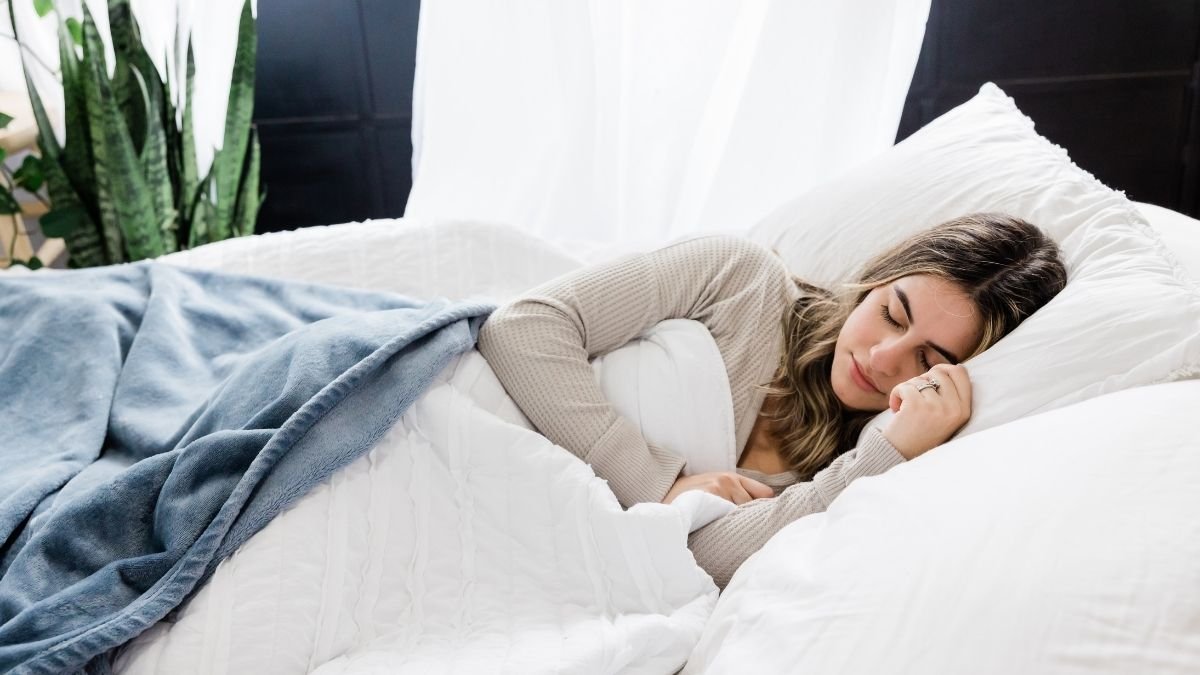
Here’s where things get fascinating.
You know how you feel amazing after a good cleaning session? Your house is spotless, everything’s organized, and you can think clearly?
Your brain does the same thing every night while you sleep.
Scientists discovered something called the glymphatic system – your brain’s built-in cleaning service. And here’s the kicker: it only works properly when you’re in deep sleep.
What Happens While You Sleep
During quality sleep, something pretty magical occurs:
- Your brain cells shrink
- This creates more space between them (about 60% more space)
- Cerebrospinal fluid rushes through like a power washer
- All the toxic junk gets flushed out
The result? Your brain clears out 2.5 times more waste during sleep compared to when you’re awake.
But here’s what’s scary: miss just one night of good sleep, and toxic proteins in your brain increase by 5%. These are the same proteins linked to Alzheimer’s disease.
One. Single. Night.
The Sleep Apnea Discovery That Changes Everything
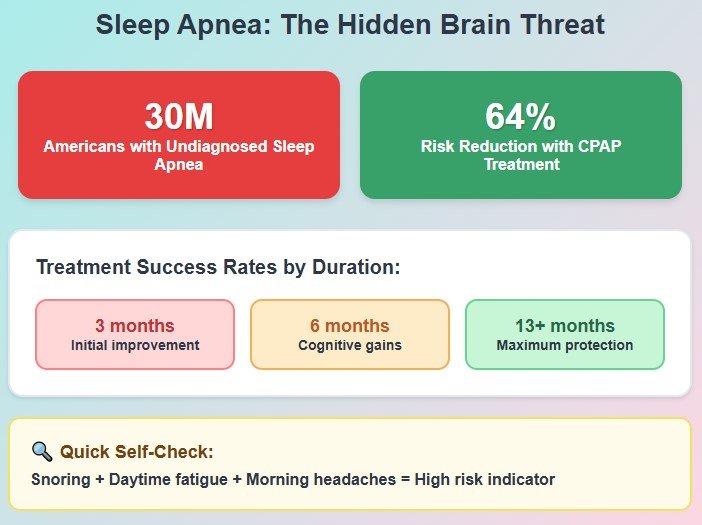
Now here’s something that’ll blow your mind.
Researchers followed 50,000+ people and found something incredible: people who properly treated their sleep apnea had a 64% lower risk of developing dementia.
Sixty-four percent!
Why This Matters to You
Sleep apnea isn’t just “loud snoring.” When your breathing stops repeatedly during the night, your brain’s cleaning cycle gets completely disrupted.
The signs you might have sleep apnea:
- Your partner complains about your snoring
- You wake up feeling exhausted (even after 8+ hours)
- You fall asleep watching TV or reading
- You wake up with headaches
- You feel foggy during the day
Here’s the thing: about 30 million Americans have undiagnosed sleep apnea. That’s roughly 1 in 10 people walking around with a fixable condition that’s damaging their brain every night.
If any of those signs sound familiar, getting a sleep study could be one of the best decisions you ever make.
The Goldilocks Zone: How Much Sleep Do You Need?
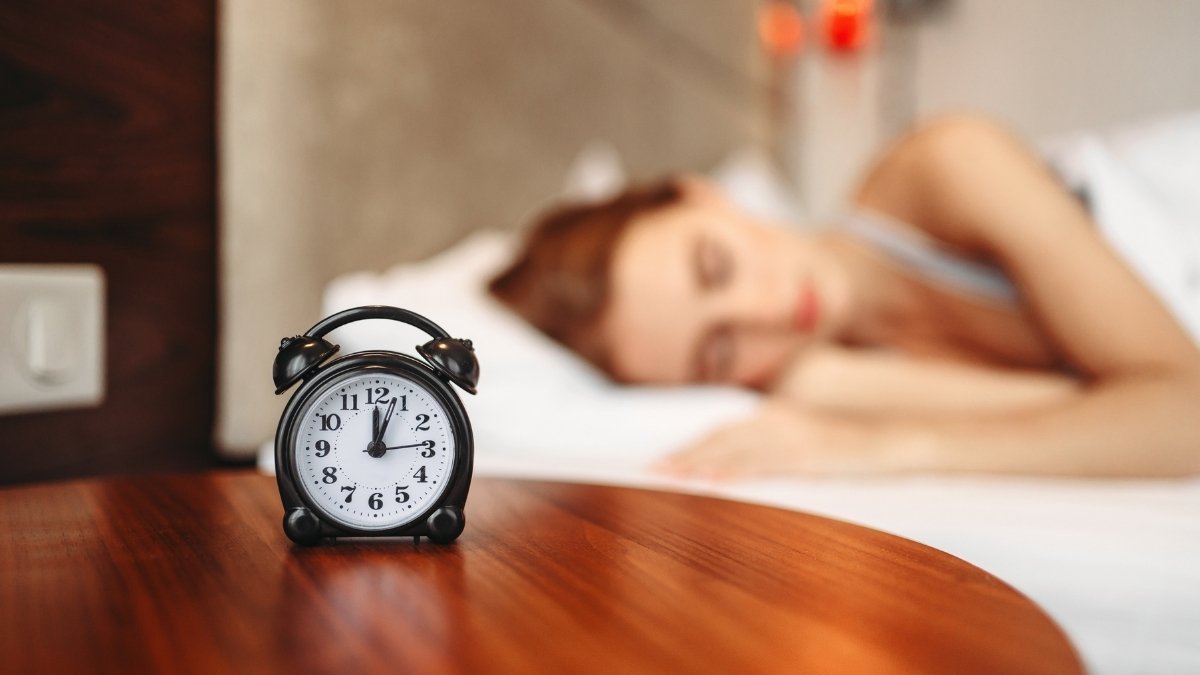
You might think “more sleep = better brain,” but the research tells a different story.
It’s not that simple.
The Age Factor You Need to Know
In your 50s and 60s:
- Sleeping 6 hours or less = 30% higher dementia risk
- Sweet spot = 7-8 hours
After age 70:
- Sleeping more than 8 hours = 64% higher dementia risk
- Sweet spot = 7-8 hours (but not more)
Why the difference? Scientists think oversleeping in older adults might signal underlying health issues or brain changes that are already happening.
The Deep Sleep Secret That Protects Your Memory
Deep Sleep: Your Memory Shield
The 10-3-2-1-0 Sleep Optimization Rule
Here’s something that completely blew my mind when I first read it.
UC Berkeley researchers found people with the same amount of Alzheimer’s plaques in their brains – but completely different memory outcomes.
What made the difference? Deep sleep quality.
The people with better deep sleep maintained sharp memories even with brain damage. The ones with poor deep sleep? Their memories suffered dramatically.
Think about that for a second. Deep sleep doesn’t just prevent damage – it protects your brain function even when damage exists.
Your Deep Sleep Action Plan
Want to maximize your deep sleep? Here’s what actually works:
The 10-3-2-1-0 Rule:
- 10 hours before bed: No more caffeine
- 3 hours before bed: No food or alcohol
- 2 hours before bed: No work or stressful activities
- 1 hour before bed: No screens
- 0: Number of times you hit snooze
Your bedroom setup:
- Cool: 65-68°F is ideal
- Dark: Blackout curtains or eye mask
- Quiet: Earplugs or white noise machine
The Age-Specific Game Plan

Your sleep needs change as you age. Here’s your decade-by-decade strategy:
Your 40s: The Foundation Years
Focus: Sleep consistency and quality over quantity
- Stick to the same bedtime every night (yes, even weekends)
- Address any sleep disruptions now before they become permanent
- Why it matters: Poor sleep in your 40s predicts cognitive decline decades later
Your 50s-60s: The Critical Window
Focus: Minimum 7 hours, maximum protection
- This is your most important decade for dementia prevention
- Get screened for sleep apnea if you have any symptoms
- The stakes: Short sleep now = 30% higher lifetime dementia risk
Your 60s-70s: The Deep Sleep Priority
Focus: Protecting that precious deep sleep
- Remember: Each 1% loss = 27% higher risk
- Sleep apnea becomes especially dangerous for women
- Consider a sleep study if you haven’t already
70+: The Balance Zone
Focus: Not too little, not too much
- Target exactly 7-8 hours
- More than 8 hours might signal problems
- Work with your doctor if you’re sleeping too much
Your 30-Day Sleep Challenge
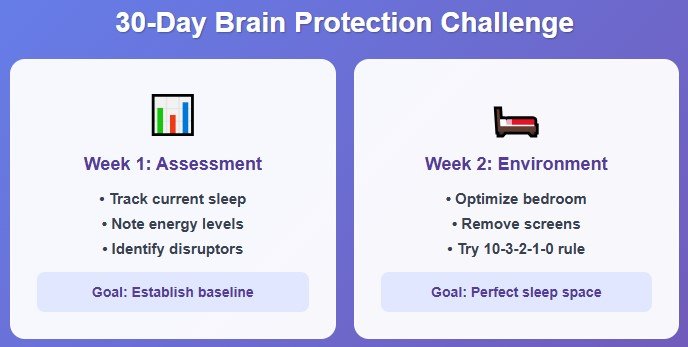
Ready to put this into action? Here’s your step-by-step plan:
Week 1: The Assessment
- Track your current sleep (use your phone or a basic tracker)
- Note how you feel each morning
- Identify your biggest sleep disruptors
Week 2: The Environment
- Optimize your bedroom temperature, darkness, and quiet
- Remove screens from the bedroom
- Try the 10-3-2-1-0 rule
Week 3: The Consistency
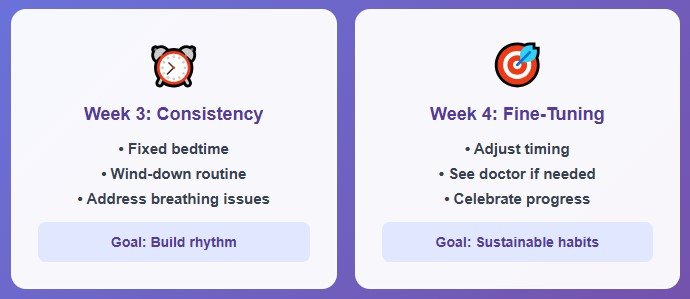
- Set a firm bedtime and stick to it
- Create a 30-minute wind-down routine
- Address any snoring or breathing issues
Week 4: The Fine-Tuning

- Adjust timing based on what worked
- Consider talking to your doctor about persistent issues
- Celebrate your progress!
The Technology That’s Changing the Game
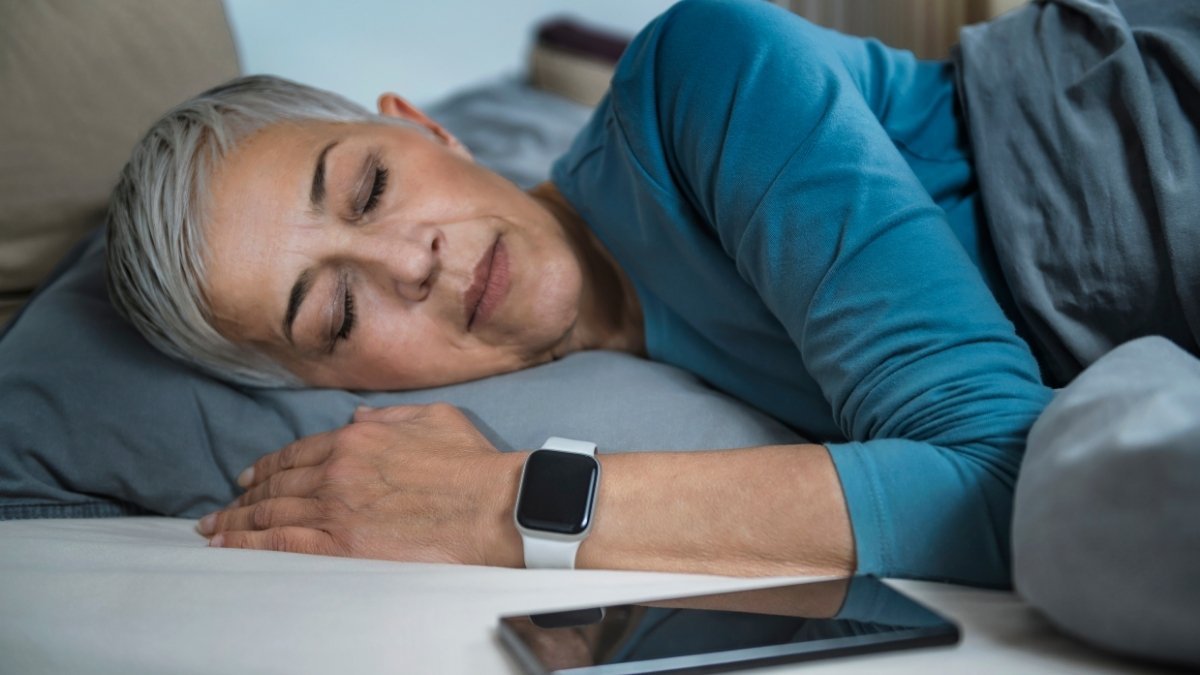
The sleep tech world is exploding right now. We’re talking about a market going from $20.52 billion in 2024 to $65.69 billion by 2033.
What this means for you: Better, more affordable tools to track and improve your sleep.
Some exciting developments:
- Wearables that measure sleep with clinical accuracy
- AI that can predict sleep quality from daytime data
- Smart home systems that optimize your sleep environment automatically
The game-changer coming soon: Researchers are developing a “sleeping cap” that can actually measure and improve your brain’s waste clearance in real-time.
Why This Changes Everything
The Great Paradigm Shift
❌ Old Approach
- • Wait for symptoms
- • Expensive drug trials
- • Limited success rates
- • Focus on cure, not prevention
- • Billions in failed research
✅ New Approach
- • Prevent before symptoms
- • Free lifestyle intervention
- • Proven effectiveness
- • Focus on sleep optimization
- • Accessible to everyone
Global Impact Potential
Here’s the thing that gets me most excited about all this research.
For decades, we’ve watched helplessly as pharmaceutical companies spent billions trying to cure Alzheimer’s after it develops. Most of those drugs failed.
But now? We have a prevention strategy that works.
It’s not expensive. It’s not complicated. It doesn’t require a prescription.
It just requires you to prioritize something you’re already doing every night.
The 2024 Lancet Commission on Dementia Prevention officially recognized sleep disorders as a modifiable risk factor. Translation: the medical establishment is finally taking this seriously.
Your Next Step
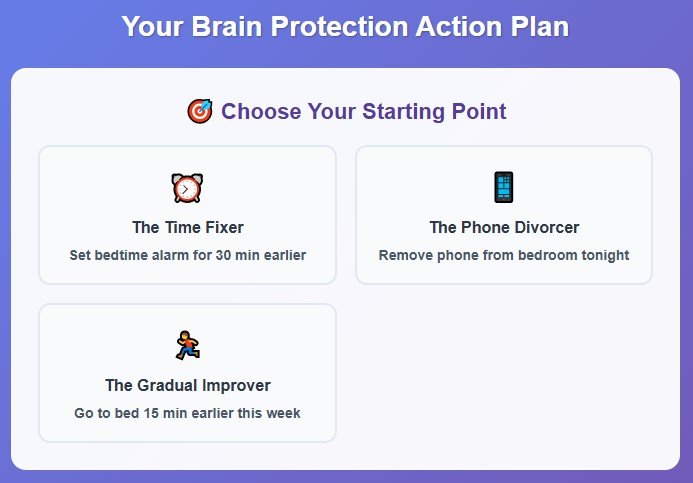
Look, I get it. Reading about sleep research is one thing. Changing your habits? That’s the real challenge.
But here’s what I want you to remember: every single night is an opportunity to protect your brain.
You don’t need to be perfect. You just need to be consistent.
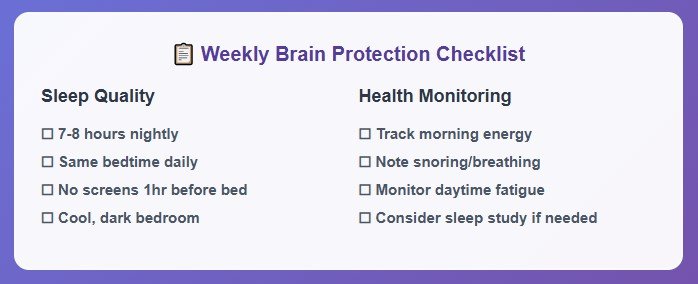
Start with one thing:
- Set a bedtime alarm (30 minutes before you want to be asleep)
- Remove your phone from the bedroom tonight
- Try going to bed 15 minutes earlier this week

Your future self – the one with sharp memories, quick thinking, and independence well into your golden years – is counting on the choices you make tonight.
The question isn’t whether sleep affects your brain health. The research has settled that debate. The question is: What are you going to do about it? Sweet dreams. Your brain will thank you.






